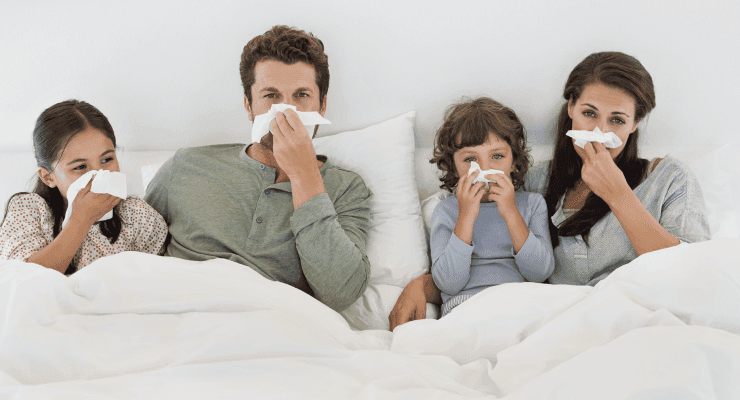Immune System – Beating Winter Colds and Flu
March 25, 2025

Optimising health is something important to us at Complete Chiropractic and with the winter season fast approaching there is no better time to immerse ourselves with facts and strategies on how we can boost our immune system and ease through the coming months with sustained and wonderful health.
On the whole, our immune system does a remarkable job of defending us against disease-causing microorganisms. But, sometimes it fails and we do become sick. While many individuals resign to expect a cold or flu each winter, there are some who gallantly seem to escape these lurgies each and every year.
Is it possible to intervene in this process and boost our immune system while making lifestyle changes in the hope of producing a near perfect immune response this winter?
Researchers are currently exploring the effects of diet, exercise, age, psychological stress and other factors on the immune response in humans. It has been suggested, that as we still wait for definitive scientifically proven links between lifestyle and enhanced immune function, a great starting point is for us to adopt healthy living strategies such as:
• Don’t smoke
Smokers have a far greater susceptibility to infections such as pneumonia and influenza. Additionally, they suffer more severe and long-lasting illnesses and if that’s not enough, smokers have lower levels of protective antioxidants (such as Vitamin C) in the blood.
• Eat a diet high in fruits, vegetables, and whole grains and low in saturated fat
Such a diet is rich in vitamins and minerals. There is some evidence that various micronutrient deficiencies – for example, deficiencies of zinc, selenium, iron, copper, folic acid and vitamins A, B6, C, and E – alter immune responses in animals. However, the effect of similar deficiencies on the human immune response has yet to be assessed. But, the research at this stage is promising, at least for some of the micronutrients.
So what can you do? If you suspect your diet is not providing all the micronutrients you need, taking a daily multivitamin and mineral supplement may be beneficial. Blood Tests can often pinpoint such deficiencies. Remember, more is not necessarily better and so for this reason, taking megadoses of a single vitamin is not recommended.
Of course, it’s important to remember our food choices are paramount as step one. We cannot expect to have a healthy immune system if a large proportion of what we put in our body comes from processed, adulterated food sources. Similarly, we cannot expect that a supplementation can replace the essential constituents of healthy food.
• Exercise regularly
This means even when it’s cold and you are unmotivated. Sure it’s tough wanting to go out and about during the wet, cold winter days. But, research indicates that moderate levels of physical activity protect us against infections from microorganisms.
Conversely, studies indicate that high intensity activities can possibly play a role in increasing susceptibility to infections.
So, this is perhaps where we need to listen to our body – if we feel a sense of over tiredness, perhaps tone down the intensity level and ensure adequate amounts of rest and recovery this winter.
• If you drink alcohol, drink only in moderation
Not only is alcohol devoid of proteins, minerals and vitamins, it actually inhibits the absorption and usage of vital nutrients such as thiamine (Vitamin B1), vitamin B12, folic acid and zinc. Thiamin (Vitamin B1) is involved in the metabolism of proteins and fat and the formation of haemoglobin.
So, it makes sense, if we are attempting to optimise our blood nutrient levels and eating sensibly, it’s also important to drink alcohol in moderation.
• Get adequate sleep
Your body needs sleep to fight infectious diseases.
Lack of sleep can affect your immune system. Studies show that people who don’t get quality sleep or enough sleep are more likely to get sick after being exposed to a virus, such as the common cold virus. Lack of sleep can also affect how fast you recover if you do get sick.
• Hand washing
Taking steps to avoid infection, such as frequent hand washing, particularly when exposed to individuals who are suffering from colds and flu can help reduce the risk of transmission.
Some most worthwhile further reading can be found with the web links at the end of this blog
Here’s to great health this winter. Enjoy the brisk days, grab some warm clothes and remember to get out and about. Our parks, beaches and the great outdoors are there to enjoy.
Sonya Blasini
http://www.health.harvard.edu/staying-healthy/how-to-boost-your-immune-system
https://www.betterhealth.vic.gov.au/health/healthyliving/smoking-effects-on-your-body
http://www.scielo.br/scielo.php?pid=S1517-86922012000300015&script=sci_arttext&tlng=en
http://www.livestrong.com/article/375909-what-are-the-effects-of-alcohol-in-vitamins-minerals/
http://www.mayoclinic.org/diseases-conditions/insomnia/expert-answers/lack-of-sleep/faq-20057757
School Student Good PostureHow To Use Chiropractic Care in the lead up to Labour
To learn more about our services, visit our homepage.
